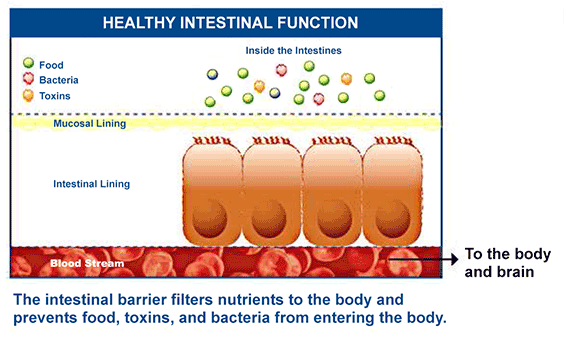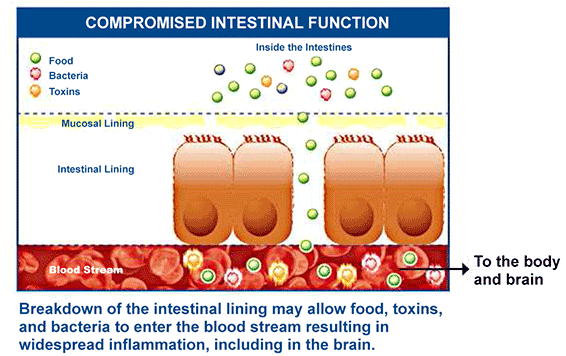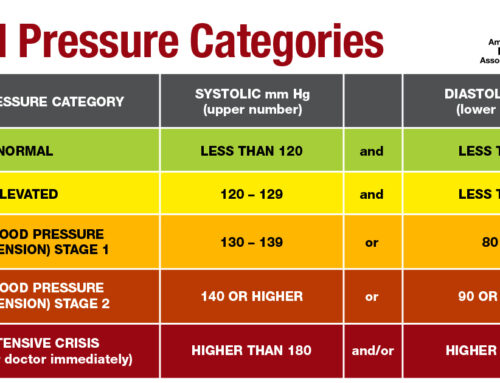by Dr. Tina Marcantel
Leaky gut syndrome is a condition in which the gastrointestinal tract has been compromised, possibly causing increased permeability that allows toxins and bacteria to “leak” into the bloodstream.
Inside your intestines (your gut) are food, bacteria, and toxins. It’s dirty in there, but that’s normal for that environment. As food passes through your gut it is broken down so the body can absorb the nutrients the food provides. An essential part of the intestines is a lining of mucous and the intestinal lining. This intestinal barrier serves as a filter that allows nutrients to pass through to enter the bloodstream and nourish the cells, while preventing bacteria and toxins from entering the blood.
When the intestinal lining becomes inflamed this barrier can break down, forming passageways for bacteria, toxins, and even microscopic food particles to enter the bloodstream. This foreign matter in the blood triggers the body’s immune system, resulting in widespread inflammation in the body that can affect all the systems, including the brain.
Signs and symptoms that may be related to this condition can vary greatly. Many people complain of GI problems including constipation or diarrhea, bloating, gas, heartburn, and irritable bowel syndrome. Since the problem is starting in the gut, that makes sense, right? But with toxins entering the bloodstream the symptoms can become much more widespread.
The skin is one area the inflammation can show up, in the form of eczema, dermatitis, and acne. There can also be chronic respiratory problems such as sinusitis, asthma, and bronchitis. (Remember that anything ending in “itis” is related to inflammation.) Signs and symptoms of arthritis and myositis, such as joint and muscle pain, can sometimes be traceable to a compromised gut, as well. I also have many patients who tell me that after they eat they get very tired or have a “foggy brain,” and once we address the gut issues these symptoms diminish or disappear.
So what causes a leaky gut? There are a number of factors that can cause the inflammation that leads to leaky gut syndrome. Chronic stress is often cited as a root cause of GI problems. An imbalance of the flora (good and bad bacteria) inside your digestive system is another. I’ve also found that intolerance to particular foods can be a major source of intestinal inflammation.
Diagnosis and Treatment
It should be noted that this is not a condition that’s taught in most mainstream medical schools, so it’s possible that your doctor may not recognize it as a “real” diagnosis. Leaky gut is described as a “syndrome,” not a disease—meaning that it may be identified by a group of symptoms that consistently occur together.
If I find that a patient’s symptoms are consistent with intestinal inflammation that can lead to leaky gut syndrome, I will recommend a food sensitivity panel. This is a blood test that measures the body’s reaction to specific foods. In this test, foods are introduced to a sample of the patient’s blood in the laboratory. The test measures how mildly or severely the blood reacts to certain foods and can help identify which foods may be causing systemic inflammation; that inflammation, in turn, can cause the previously discussed signs and symptoms. With that information the doctor and patient can then plan a good rotation diet to start the healing process.
To learn more about food sensitivity testing and see some case studies on how it can help, please read my article Are Foods Making You Sick?
After eliminating foods that are causing the problem, I’ll usually start the patient on a strong probiotic to help re-establish good flora in the gut. Along with the probiotic I also recommend a supplement that contains immunoglobulins that help to repair the mucosal lining so the bacteria and toxins will be blocked from passing through to the bloodstream.






